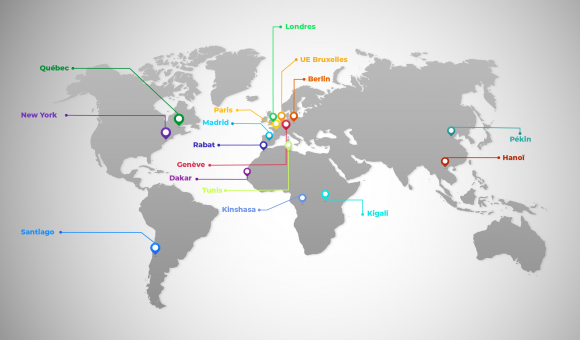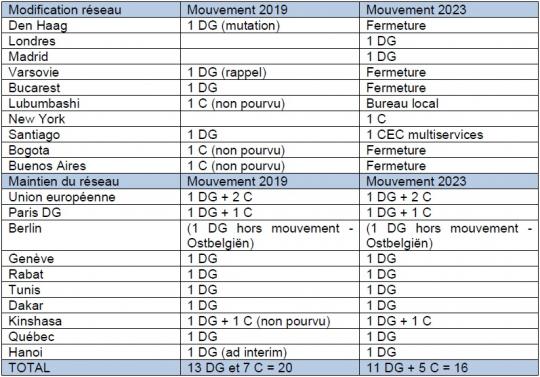
In a global context in which developments are accelerating at an ever-increasing pace, the networks of Wallonia-Brussels are being redeployed to better represent the interests of the people of Wallonia and Brussels abroad.
In view of the next diplomatic rotation in September 2023, the governments of Wallonia and of the Wallonia-Brussels Federation have decided to establish new guidelines for their diplomatic network abroad.
The international policy notes (NPI) of Wallonia and the Wallonia-Brussels Federation have identified the levers for action and the various challenges to be met in order to secure the place of Wallonia and the Wallonia-Brussels Federation on the international stage.
The diplomatic network abroad must play a leading role in the activation of these levers, whether in the diplomatic, economic, scientific or cultural fields.
To be able to continue to defend and promote the interests and the strengths of Wallonia and the Brussels-Wallonia Federation in a constantly changing world, this network must adapt to the context in which it is evolving and to the resources at its disposal. In some cases, this requires the focusing of strengths to achieve increased visibility.
Here is an overview of the key changes that will take effect at the time of the next diplomatic rotation in September 2023. The other posts of the diplomatic network abroad will remain as they are.
Europe
Opening of a general delegation in the United Kingdom
In the wake of Brexit, the United Kingdom’s political and institutional positioning has changed significantly since the previous diplomatic rotation. Indeed, bilateral cooperation can no longer take place via the European institutions. It is therefore essential to rethink the relationship with the United Kingdom and rebuild it on new foundations to position Wallonia and the Wallonia-Brussels Federation as key partners of the United Kingdom.
Opening of a general delegation in Spain, with accreditation to Portugal
The two editions of Casa Valonia (2019 and 2021) put the spotlight on the strengths of Wallonia and the Wallonia-Brussels Federation in Spain. They showed Spain’s interest in and recognition of our different areas of expertise, whether cultural, academic, scientific, economic or commercial.
In addition to the importance of the Spanish market for economic trade, cooperation exists with respect to academic, scientific and cultural partnerships.
A similar case can be made for Portugal, which facilitates our access to the Portuguese-speaking world, in particular in Africa and Latin America.
Closure of the general delegation in the Netherlands
This closure can be explained in particular by the European dynamics but also by the strong political interactions in the context of the cross-border and interregional ecosystem, which make the role of an institutional representation less useful.
Closure of the general delegations in Warsaw and Bucharest
Since the accession of these countries to the European Union, bilateral cooperation has been impacted insofar as relations are now forged through European cooperation.
As far as Poland is concerned, the closure of the general delegation in Warsaw was a response to the many abuses of the Polish government. Unfortunately, the internal political situation still does not allow the restoration of institutional cooperation with the country.
With regard to Romania, the actions currently conducted are mainly in support of sectoral projects from the WBI headquarters, and less as part of a diplomatic approach. Moreover, the Francophone point of reference still constitutes an added value but is managed at the multilateral level, directly from the bodies of the Organisation Internationale de la Francophonie (OIF).
North and Central America
Opening of a diplomatic office in New York
The arrival of the Biden administration and the positive signals given by the United States in a series of matters that directly affect the Regions and Communities (sustainable development, climate, human rights, health, digital technology, collaboration on research and innovation, etc.) is making it possible to consider a more institutional presence.
The creation of a post in New York will complement the diplomatic coverage for other multilateral issues related to the UN (reinforcing our current set-up, i.e. the Delegations to the European Union, in Paris (covering the OIF, UNESCO and the OECD) and Geneva). Indeed, New York hosts four of the five main UN bodies as well as the headquarters of several important programmes and agencies.
Closure of the APEFE office in Haiti
Following the announcement by the Association for the Promotion of Education and Training Abroad (APEFE) of its withdrawal from Haiti by the end of 2021, the APEFE office to which WBI’s activities were linked will be closed, in a context in which the security conditions no longer allow for untroubled and proactive work. Furthermore, Haiti is no longer a priority country for cooperation.
Latin America
Removal of the diplomatic adviser posts in Colombia and Argentina
Previous Governments had identified these two countries as a focus of attention, in particular in the area of higher education (several fairs are organised there and institutions of higher education are attentive to these two countries). The diplomatic rotation has been unable to fill these two posts reserved for Diplomatic Advisers. It is clear that there are therefore no real needs at a diplomatic level.
Establishment of a multi-service delegation in Chile
Maintaining a general delegation does not appear to be the most efficient option at this stage. Nevertheless, our work programme remains active, in particular through cultural, academic and scientific partnerships, and a resurgence of Francophile cultural interest in Chile.
Finally, concerning the Democratic Republic of Congo, the addition of a Diplomatic Adviser in the local office in Lubumbashi is no longer a priority thanks to the work done by the local team, under the diplomatic supervision of the Delegation in Kinshasa. The Lubumbashi office makes it possible to carry out territorial monitoring, in particular with Katanga, given that it is physically difficult to carry out this monitoring from Kinshasa and the DRC’s neighbouring countries.
Pierre-Yves Jeholet, Minister-President of the Wallonia-Brussels Federation: “The diplomatic network of the Wallonia-Brussels Federation is essential to the promotion of our talents, in particular our sporting, cultural and academic talents, on the international stage. It is therefore important to be able to continuously evaluate it and to dare to redefine new approaches in line with our international policy notes. This new distribution is part of a strong ambition for international issues relating to the competencies of the Wallonia-Brussels Federation.”
Elio Di Rupo, Minister-President of Wallonia: “This decision makes it possible to deploy Wallonia’s diplomatic network more effectively and to better integrate it into an ever-changing world. This is an important step for a region that intends to enhance its tangible and intangible human heritage, and that seeks to boost its international visibility for the benefit of its businesses and its population.”
Summary for the next diplomatic rotation 2023

DG: General Representative
C: Advisor
CEC: Economic and commercial advisers